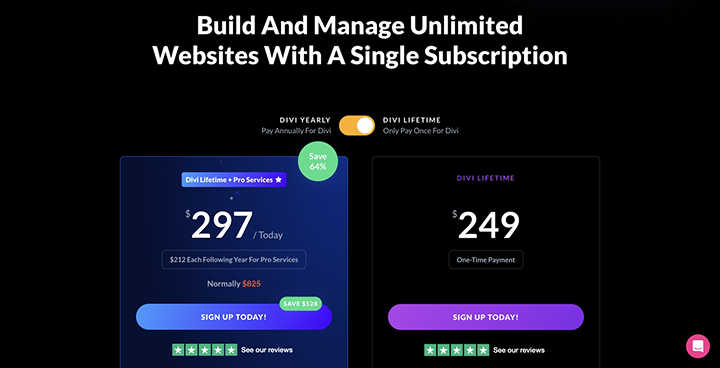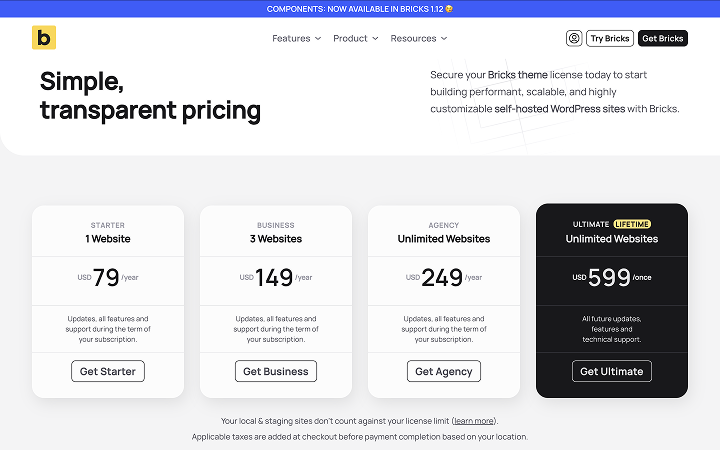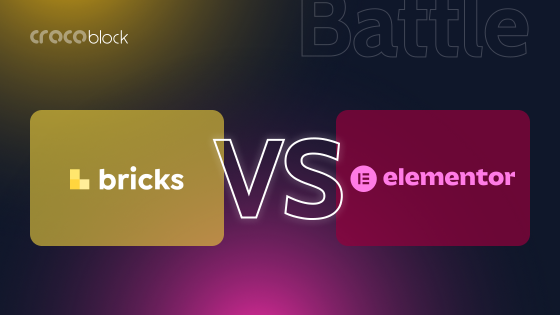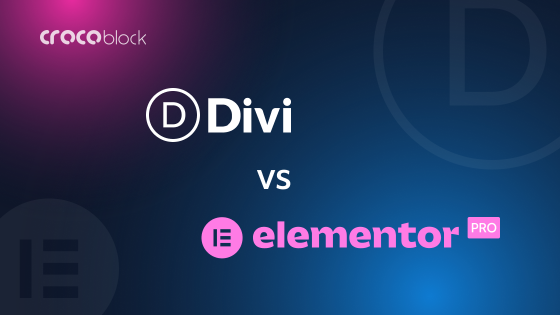When it comes to building websites with WordPress, choosing the right page builder can make all the difference. Among the many options available, Divi and Bricks Builder stand out as two powerful contenders.
While Elementor remains one of the most popular visual builders, Bricks and Divi have their more niche but extremely loyal fans. Also, both of them don’t have a free version.
A few years ago, Divi underwent a major revamp, significantly improving performance and adding advanced design features. Around the same time, Bricks entered the scene, shaking up the community with its lightweight structure, speed, and developer-friendly approach.
So, if you are a beginner and are developing a WordPress website in 2025, let’s figure out which of these two builders will work best for you. Read on.
Table of Contents
- What Is Divi Website Builder?
- What Is Bricks Website Builder?
- Divi vs. Bricks Features Comparison
- Divi vs. Bricks: Which Is Better for Beginners?
- FAQ
- Choosing Between Divi and Bricks
What Is Divi Website Builder?
Divi is a popular WordPress page builder and theme developed by Elegant Themes. Launched in 2013, it has become one of the most widely used website-building tools, thanks to its intuitive drag-and-drop interface, extensive design options, and vast template library.
At its core, Divi is a visual builder, meaning you can create and customize your website in real time without touching a single line of code.
Key features of Divi:
✔ Visual editor — easily customize your site with a live preview of changes.
✔ Pre-made layouts and templates — access over 2,600+ ready-to-use designs for different industries.
✔ Global styles and elements — save and reuse design elements across multiple pages.
✔ Built-in A/B testing — optimize conversions by testing different layouts and content variations.
✔ Building blocks for every occasion — Divi Builder has blocks for different needs and hundreds of additional modules in the Divi Marketplace.
✔ WooCommerce modules — create custom product pages and online stores with ease.
✔ Role editor and theme builder — control user permissions and design every part of your site, including headers, footers, and post templates.
What Is Bricks Website Builder?
Bricks is a modern, high-performance WordPress page builder designed for speed, flexibility, and full-site customization. Launched in 2021, it has quickly gained a strong reputation among developers and performance-conscious users due to its clean code output, lightweight structure, and deep customization capabilities.
The builder helps create unique website experiences with conditional logic, allows defining triggers and actions for user interactions, and offers native full-site editing.
Key features of Bricks:
✔ Lightning-fast performance — Bricks is optimized for speed, producing minimal, clean code.
✔ Drag-and-drop visual editor — build your entire website in a real-time, front-end editing environment.
✔ Powerful tools for layout editing — Query loop builder, Menu builder, Conditional logic, and more.
✔ Dynamic data, custom fields, and custom post types integration — easily pull content from JetEngine, ACF (Advanced Custom Fields), Meta Box, Pods, and Toolset for advanced customization.
✔ Developer-friendly — Bricks has quite a few custom hooks and detailed developer documentation on them and other features for coders.
✔ WooCommerce ready — create custom products and checkout pages with full design freedom.
✔ One-time pricing — unlike many builders that use a subscription model, Bricks also offers a lifetime deal, making it a cost-effective option.
Divi vs. Bricks Features Comparison
When choosing between Divi and Bricks, it’s essential to weigh their strengths and weaknesses in relation to your project’s needs. Both are WordPress page builders with lifetime licensing options, yet they cater to slightly different audiences and priorities.
Ease of use and learning curve
Divi is designed for beginners, offering a user-friendly drag-and-drop editor that allows for quick website creation without requiring coding knowledge. Clients also find it easy to make small edits, reducing their reliance on developers. The learning curve is relatively shallow, making Divi a popular choice for freelancers and agencies that need to launch websites quickly.
Bricks, while modern and efficient, lean more toward users with some technical expertise. It offers a fast and clean editing experience but requires a deeper understanding of web development concepts. Although it’s not overly complex, beginners might find it more challenging to master compared to Divi.
Performance and speed
Divi page builder has been criticized for its performance drawbacks, with users reporting slower load times. Even with caching and optimization, achieving high page speed scores may require additional work, including custom CSS.
Bricks, in contrast, is built with performance in mind. Its lightweight, clean code results in significantly faster load times and better SEO performance. Many users who switch from Divi to Bricks notice an immediate improvement in site speed and efficiency, making it the preferred choice for performance-focused projects.
Customization and flexibility
Divi provides a vast library of pre-designed templates, making it easy to create a wide range of website types, from eCommerce to booking systems. However, its customization options have some limitations and complex modifications often require custom CSS or third-party plugins.
Bricks excels in advanced customization and dynamic functionality. Unlike Divi, which relies on custom CSS and JavaScript for full layout control, Bricks leverages Flexbox to enable the creation of complex layouts without the need for custom coding.
Community, support, and ecosystem
Divi has been around longer, cultivating a large and active community. Users have access to extensive documentation, tutorials, and a vast range of third-party plugins. Its adoption makes it a reliable option for freelancers and agencies.
Bricks page builder, while newer, is growing rapidly. Its development team actively engages with users and provides strong support, but the community and third-party ecosystem are not as extensive as Divi’s. Those who prefer communities with plenty of resources might find Divi a better choice.
Pricing
Neither Divi nor Bricks offer a free version. Both require a purchase to unlock full functionality, though you might be able to explore demos or a money-back guarantee period to test the builder before committing.
Divi offers both annual memberships and a lifetime license. The membership model is beneficial if you prefer spreading costs over time, while the lifetime option provides long-term savings.

Bricks, on the other hand, emphasizes a lifetime license model with potential tiered pricing based on usage. This model simplifies cost considerations by eliminating recurring fees.

So, if you prefer the flexibility of a subscription model with access to a broader suite of tools (beyond just the page builder), Divi might be more appealing.
But if you’re looking for a modern, performance-optimized builder and want the simplicity of a one-time purchase with lifetime updates and support, Bricks could be the better option.
Ultimately, your choice between Divi and Bricks from a pricing standpoint will depend on how you plan to use the tool, the number of sites you manage, and whether you prefer a subscription-based model or a one-time investment.
Divi vs. Bricks: Which Is Better for Beginners?
Choose Divi if:
- You value ease of use and quick setup, especially if you or your clients are less technically inclined.
- You need access to a vast array of pre-built layouts and templates to jumpstart your design process.
- You manage a wide range of projects, from small personal websites to larger, multi-functional sites, and you prefer a well-established community for support.
Choose Bricks if:
- Performance and speed are your top priorities, and you’re looking for a builder that produces clean, efficient code.
- You want a tool that allows you to visualize and query data effortlessly, offers customization, supports unlimited responsive editing with custom breakpoints, and provides the flexibility of a desktop- or mobile-first approach.
- You prefer a modern development approach and are interested in leveraging a builder that encourages you to learn more about the underlying web technologies.
Some long-time Divi users have switched to Bricks, reporting that they wasted time with Divi and found Bricks to be a more efficient way to work.
Other users are waiting for Divi 5, hoping it will address some of the performance issues. One user said, “It will be interesting to see if Divi 5 delivers on the speed promises.”
FAQ
It is a visual site builder theme for your self-hosted WordPress website, launched in 2021. It has powerful features, helping to create engaging websites with clean code and fast-loading pages.
It is a no-code visual website builder for WordPress. It offers an additional ecosystem by Elegant Themes: themes, predesigned layouts, cloud storage, and more (for an extra price).
Bricks is a drag-and-drop builder, while Divi is a visual one based on rows and columns. Bricks is more of an empty canvas for those who prefer custom solutions and full control. Divi, in turn, is more about premade solutions and straightforward settings, e.g., you can easily create elements like Divi mega menus or a Divi pricing table.
Yes. Divi has a Table Maker module, which helps to get full control over the table layout and design.
Choosing Between Divi and Bricks
Both Divi and Bricks offer excellent features for WordPress website creation. They are intuitive and user-friendly, but Divi is generally easier for beginners. It provides a wealth of instructions, videos, and a large community that’s always ready to help. Bricks, on the other hand, is a newer builder that is rapidly gaining popularity. It boasts lightning-fast performance and powerful tools for website creation.
Ultimately, your choice between Divi and Bricks will depend on your specific project requirements, technical expertise, and long-term goals. Both tools have their strengths, so carefully weighing these factors will help you make the best decision for your website-building journey.

